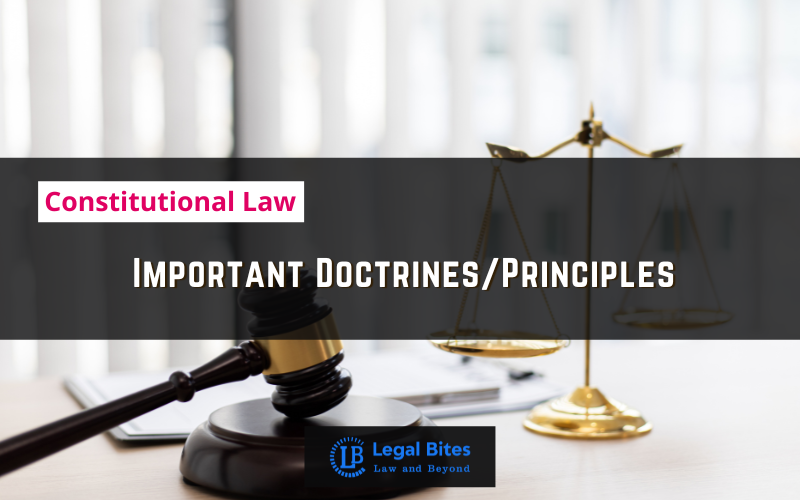What is meant by Delegated Legislation? Discuss the legislative and judicial control mechanism over delegated legislation.
Question: What is meant by Delegated Legislation? Discuss the legislative and judicial control mechanism over delegated legislation. Find the answer to the mains question only on Legal Bites.[What is meant by Delegated Legislation? Discuss the legislative and judicial control mechanism over delegated legislation.] Answer Delegated legislation is a kind of subordinate legislation. Generally, the ‘delegated legislation’ means the… Read More »
;
Question: What is meant by Delegated Legislation? Discuss the legislative and judicial control mechanism over delegated legislation. Find the answer to the mains question only on Legal Bites.[What is meant by Delegated Legislation? Discuss the legislative and judicial control mechanism over delegated legislation.] Answer Delegated legislation is a kind of subordinate legislation. Generally, the ‘delegated legislation’ means the law made by the executive under the powers delegated to it...
Question: What is meant by Delegated Legislation? Discuss the legislative and judicial control mechanism over delegated legislation.
Find the answer to the mains question only on Legal Bites.[What is meant by Delegated Legislation? Discuss the legislative and judicial control mechanism over delegated legislation.]
Answer
Delegated legislation is a kind of subordinate legislation. Generally, the ‘delegated legislation’ means the law made by the executive under the powers delegated to it by the supreme legislative authority. It comes in the form of orders, by-laws, etc. The Committee on Minister’s power said that the term delegated legislation has two meanings-
- Firstly, it means the exercise of power that is delegated to the execution to make rules.
- Secondly, it means the output or the rules or regulations, etc. made under the power so given.
The power to make subordinate legislation is derived from the existing enabling act. It is fundamental that the delegate on whom such power is conferred has to act within the limits of the enabling act. Its purpose is to supplant and not to supplement the law. Its
The following safeguards have been generally suggested by jurists against the delegated legislation:-
Legislative Control
Under a parliamentary democracy, it is a function of the legislature to legislate, with duty to look upon its agent, how they are working. In India Legislative Control or Parliamentary control is an inherent constitutional function because the executive is responsible to the legislature at two stages of control.
- Initial stage
- Direct and Indirect stage
In the initial stage, it is to decide how much power is required to be delegated for completing the particular task, and it also observed that delegation of power is valid or not. On the other hand, Direct Control involves the ‘laying Process’, meaning that after making the rule it should be placed before the Parliament. Further, indirect control is also exercised by Parliament and its committees where the main object of the committee is to examine
- Whether the rule is according to the general object of the act.
- Whether it safeguards or destroys the Principle of Natural Justice.
- It bars the jurisdiction of the court in direct or indirect ways.
- Whether it has a retrospective effect or not.
- The expenditure involved in it is from the consolidated fund.
Judicial Control
Judicial review is the most essential attribute under rule of law. The court has vested with the power of judicial review to check the power delegated is within the ambit of the constitution as prescribed; otherwise, the impugned law is struck down, being ultra vires in nature. As per Article 13(3) (a) “Law” is defined under the Constitution which clearly indicates that the State shouldn’t make any law that abridges the fundamental right given in Part III of the Constitution. It is dependent on two basic grounds:
- It is ultra vires to the Constitution of India, and
- It is ultra vires to the enabling Act.
Important Mains Questions Series for Judiciary, APO & University Exams
- Constitutional Law Mains Questions Series Part-I
- Constitutional Law Mains Questions Series Part-I
- Constitutional Law Mains Questions Series Part-II
- Constitutional Law Mains Questions Series Part-IV
- Constitutional Law Mains Questions Series Part-V
- Constitutional Law Mains Questions Series Part-VI
- Constitutional Law Mains Questions Series Part-VII
- Constitutional Law Mains Questions Series Part-VIII
- Constitutional Law Mains Questions Series Part-IX
- Constitutional Law Mains Questions Series Part-X



